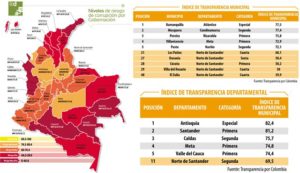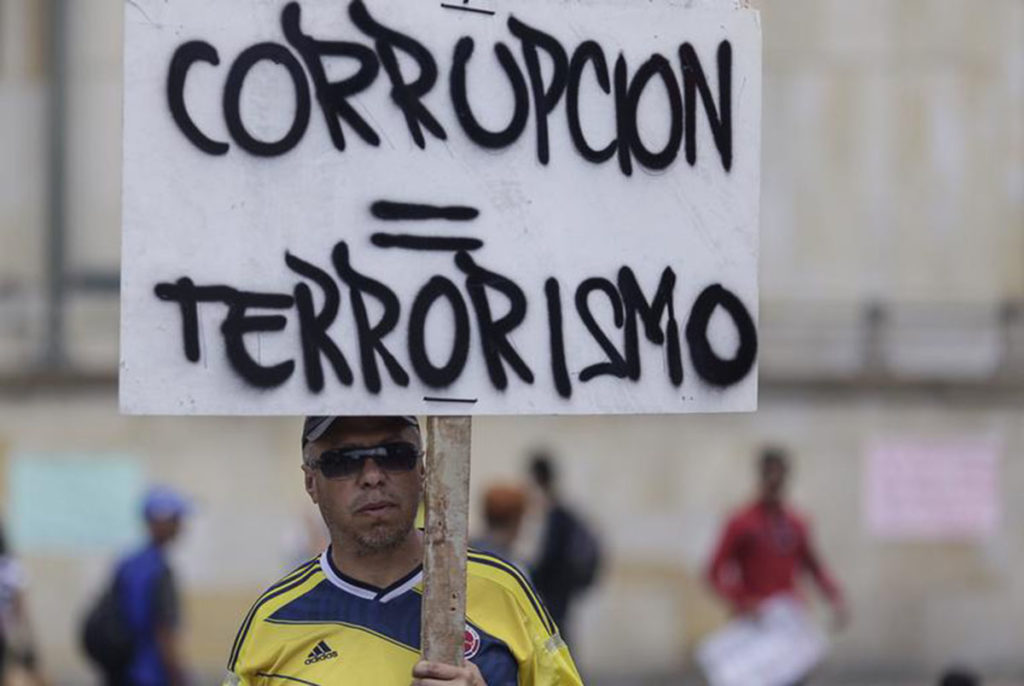With so little social mobility, can corruption in Colombia be a legitimate path out of poverty?
By Casey Jones
What follows is one contributor’s view of how corruption in Colombia can often play out, and that many of those who engage in the practice are not the selfish villains they are made out to be.
A few years ago, I met a young couple who were the friends of my partner’s family on a beach. The man talked a bit too much, and the woman was a little snobby, but they were basically nice people. I say nice because they seemed to sincerely care about each other, the way they spoke to and about each other was very loving. They had a newborn baby and that drove the conversation to plans for the future, and concerns about how they would provide for their child. They were also considerate of others; at one point I was trying to find water but couldn’t, so the man walked a long way down the beach to find some for me.
Some brief context – I am a foreigner who has lived in Colombia for a number of years and am married to a Colombian. We had met the couple on the Caribbean coast while on holiday.
Some time later, I was speaking to my partner and the couple came up in conversation. My partner said the woman had been arrested for corruption after having been caught soliciting a bribe. The man was a civil servant in the mayor’s office in the coastal town where they lived, and the woman was a judge. She made around the equivalent of $2,000 USD a month – a handsome wage in Colombia – and was shaking someone down for roughly $50,000 USD for a favorable ruling in a civil case. Her boss, who had instructed her to do this (of this written proof supposedly existed) had fled the country with a good deal of money. The new mother was put behind bars awaiting trial.
I was horrified. Corruption in Colombia is more than a dirty word, it is a cancer on the society to which most of its ills may be attributed.
The woman was ultimately sentenced to a prison term and that was the last I had heard. Afterward, I had comfortably consigned the whole thing to a lack of morals. I felt self-righteous and probably a little smug. You don’t hear about this sort of thing happening where I am from, though of course it does, but to a much lesser extent.
But why does it happen to a greater extent here? What makes corruption in Colombia something so widely engaged in, and at every level of the society? Around a year ago I was speaking to a Colombian friend from a small town, who told me: “In smaller cities and towns, you are either a land owner, a politician or you are poor”. It is, of course, a generalization, but a pretty accurate one.
Related: When Apathy Reigns, Corruption Wins
In the big cities like Bogota, Medellin, Cali and Barranquilla, the affluence of many of its residents are on full display. In the rest of the country – in places where easily more than half of all Colombians reside – people dwell in areas that only matter to the government because of resources and votes. If you control land (resources) or you can control some votes, you can make good money. Otherwise, you must try to eke out an existence through manual labor, and if you’re lucky you might be able to pull in the equivalent of about $262 USD a month.
Few Paths Out of Poverty
You are unlikely to get hold of land unless you inherit the means of owning it, and that rarely ever happens outside of families that are already rich and landed, and have been for generations. So if you’re ambitious and want to better your lot in life, getting into politics and influencing how people vote is the way to go.
Upper-class land owners and politicians (if they aren’t direct blood relatives) work hand in hand, using a mixture of bribery and coercion to get their way. So if you’re from a small town and you were unfortunate enough to be born into a poor family, then your choice tends to be: a) stay out of politics and the civil service and languish in poverty, or b) involve yourself in those fields and get a chance at upward mobility.

Map from Transparencia Por Colombia, showing the levels of corruption in Colombia’s 32 provinces. The areas in red and burgundy indicate high to very high levels of corruption.
The Spanish came to Latin America to loot it; any investment that happened along the way was purely coincidental. Those investments went toward helping accelerate the extraction of resources, or providing comfort to those who were charged with ruling over those who toiled. The people who picked up the torch after the Spanish left had the same attitude towards the country as the ones who had pillaged it. Centuries have passed, but not much has changed. The country is still characterized by poor quality and inadequate infrastructure, very little state funding, and, of course, violence. In Colombia, force, or the threat of it, is political in nature, even when it is drug related.
Modern Colombia has been governed from at least the 1950s onward (and many Colombians would suggest always), by oligarchs who have constructed a kind of feudal system that functions by entrenching the wealthy and privileged at the top, while keeping the majority in a state of servitude.
The government at all levels wants things; money, votes and resources – and for the most part, they don’t care how they acquire these things – so long as they do. And often when they do not get what they want, violence, or the threat of it, is usually the tool of choice. Should a brave soul dare stand against this acquisition of resources or influence, and organize others to do so, they are as good as dead. This is why so many community organizers and journalists are killed almost on a daily basis here.
As long as no one interferes with the machinery of the system, people can basically go about their business. The government takes every opportunity to pay lip-service to the tenants of liberal democracy – and does this particularly well on the world stage – but in reality, the fundamental apparatuses of the state are woefully inadequate, broken, or never existed in the first place.
The absence of the state is the real problem for most rural Colombians – and I don’t mean that as a middle finger to the libertarians out there. I mean, there is no rule of law and no basic infrastructure like roads, leaving such communities vulnerable to the influence of illegal armed groups, who roll in and lay down their own laws as they see fit. It is quite easy, then, to see why people might consider arming themselves to protect their communities as a viable option.
The national government, like their Spanish predecessors, are here to get stuff out of Colombia at the highest possible profit margin. Their attitude can be summed up as “Stay out of our way and we will stay out of yours” – even if what’s in their way is your home.
Corruption in Colombia: Not a Choice?
Let’s think about the actions of the couple I met on the beach some years ago. Would you have acted differently? If you were confronted with the choice between an honest life of poverty, or a comfortable life provided for through dirty or underhanded dealings, which would you choose?
The choice is an easy one to make. But consider this – what happens when the corruption you engage in isn’t a choice you get to make? When working honestly will get you fired? In the case my acquaintance the judge, she would have been explicitly told to extort bribes from defendants and pass that money up the chain. And from that bribe, she would have pocketed maybe about 10 percent of it.
Colombia and the systemic problems it faces are not confined within its borders. These kinds of problems are seen everywhere that a Conquistador (or their Portuguese equivalent) has set foot – that is to say – every single country in Latin America.
Related: Colombia’s Broken Social Contract
The culture is anarchic in the true sense of the word. There is little sense of community, little concern for others, and family groups circle in on themselves and protect their own interests. Yet paradoxically, Colombians are some of the most kind, generous and well-meaning people I have ever met. They are the equal of anyone else in terms of their work ethic, personal morality, family values, and emotional intelligence. But they are unable to exercise these values, morals and ethics collectively as a society, because no unspoken social contract exists.
A healthy and functioning society, crudely stated, is one where the citizens know that what they put into it is what they get out of it. A society where there isn’t an unbridgeable gap between the lower, middle and upper classes. This kind of society isn’t inevitable, nor is it impossible – change is attainable only if a critical mass of people want it bad enough to fight for it.
In the meantime, people will do whatever it takes to survive and to thrive, even within the confines of the oligarchy’s shadow. And in such a backward system, low- and mid-level corruption in Colombia is an honest living as far as I’m concerned.

Journalist. Misfit. Malcontent. Provocateur. Is a better Colombia is possible? We’re starting to have doubts.


The title of this article is deceptive and leads readers to think that only through corruption can lives improve. How corrupt that thinking is! Please give historical examples, in Colombia or elsewhere, where corruption has led a nation or community out of poverty. Thank you.
Responses to the Protestant Reformation in America and Europe addresses the issues of which you speak. John Calvin and his followers introduced great prosperity through their writings. Many attribute the rise of capitalism to John Calvin, the reformer. Even poor people in an industrialized nation are better off than the average person in Colombia. People on welfare in America would be considered rich in Colombia. How may realize and admit this?